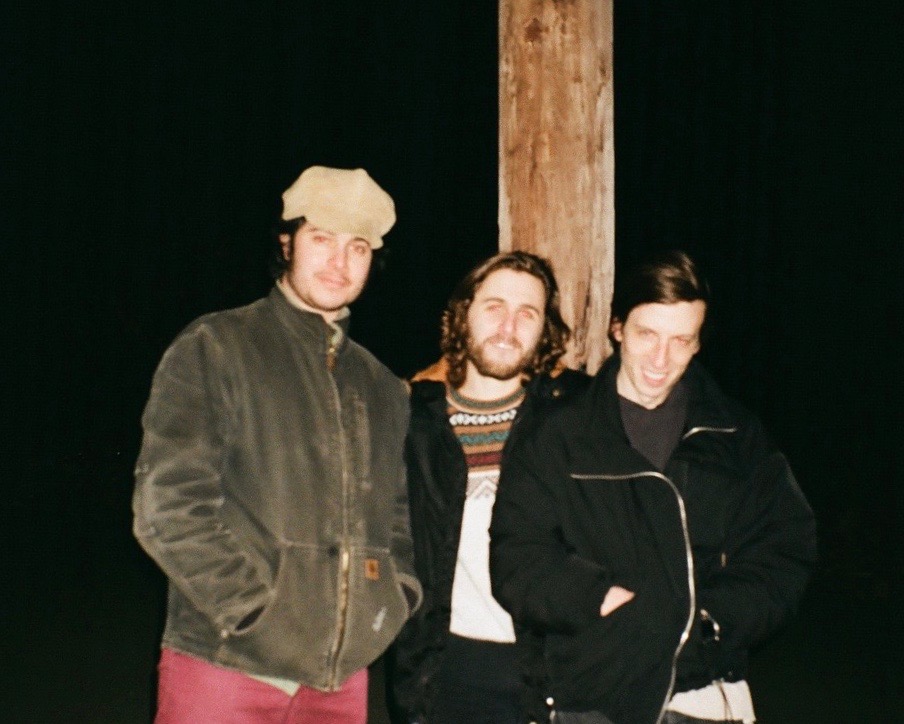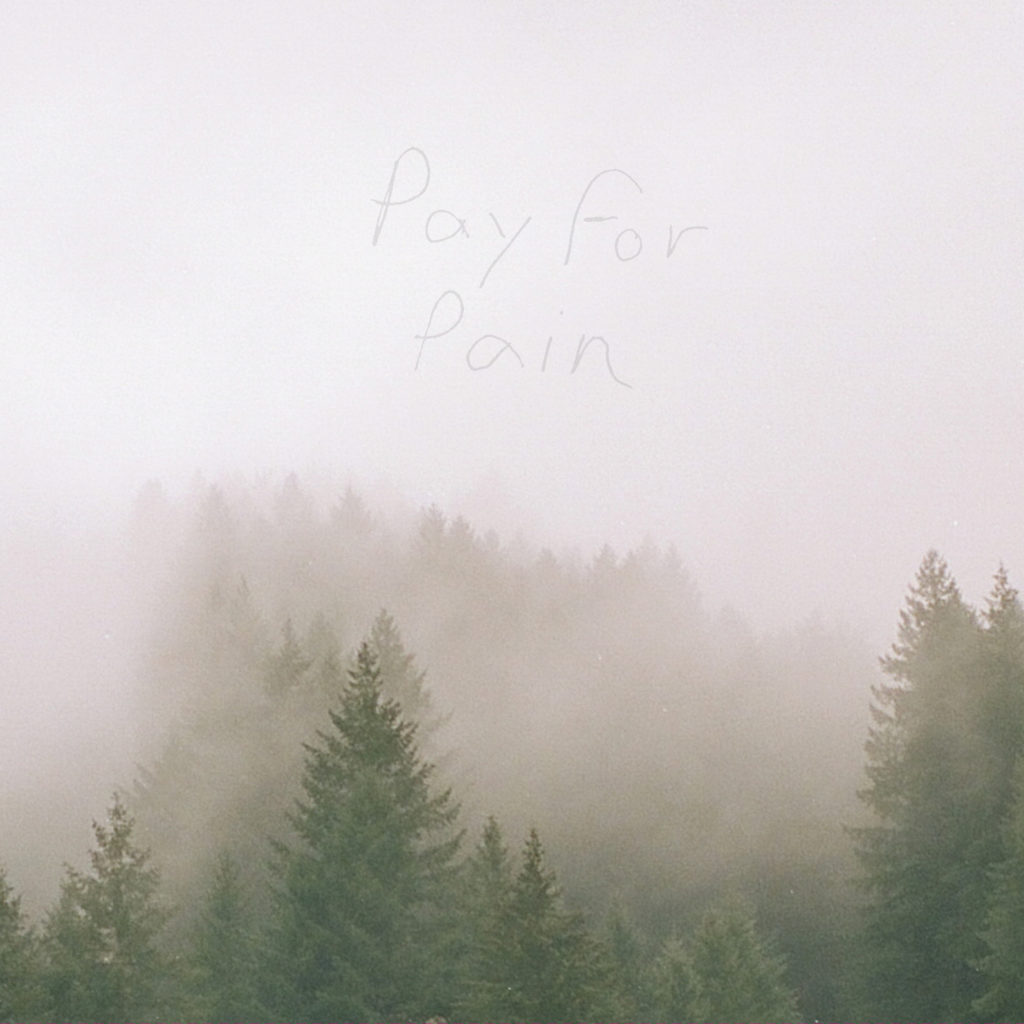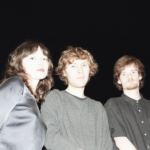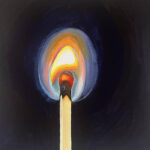Interview: Pay for Pain Discuss Their Debut Self-Titled EP
Posted: by The Alt Editing Staff

Some may say that Pay for Pain is a supergroup for indie rock lovers. The band consisting of Adam McIlwee (Tigers Jaw, Wicca Phase Springs Eternal), Dennis Mishko and Pat Brier (Tigers Jaw, Three Man Cannon) have a created a familiar yet unique sound on their debut EP “Pay for Pain” Sarah was able to talk to Adam and Pat about how the group began, the sound they created and their history as musicians across so many projects, leading up to Pay for Pain.
Sarah: I know you have multiple projects including Wicca Phase, what made you want to form Pay for Pain?
Adam: I think it was just wanted to play with Pat and Dennis again. Honestly, it wasn’t much more than that. I hadn’t played an instrument with people in a little while, so that was nice. I’ve played with Pat and Dennis for so many years and then once we left Tiger’s Jaw, it just kind of stopped you know. Pat and Dennis had Three Man Cannon, so they were still playing together and stuff. Otherwise, I wasn’t doing anything musically with other people. So it started off like that years ago, maybe 2016 or 2017. Then it was just us practicing and playing together once every 6 months until we decided to record. Then we started to take it a little more seriously.
Pat: Kind of the same thing that Adam was saying, we just played together for a long time and we all just kind of missed doing it. I feel like I can speak for Dennis here where we really just all wanted to play together again. I’ve always loved making music with Adam or Dennis. I just moved home, I lived in Philly for 10 years, and now I’m back in the Scranton, PA area. So that provided a reason to get together. Especially, Adam is here and Dennis lives in Brooklyn but comes here often.
Adam: Dennis moved out of Scranton within a month of Pat moving back. So for about a month we were pretty in sync.
Pat: It was pretty insane because Dennis lived in the area the whole time I was in Philly and then I come home and he leaves.
Sarah: Oh man, that must’ve sucked.
Pat: It was definitely a bummer.
Well it seems like you worked it out together. From my understanding you both formed this project a couple of years ago so why release the EP now and if you can dive a little bit into how this EP began and your songwriting process?
Adam: So the songs are split 3 and 3. I have 3 songs on there that I wrote and Dennis has 3. I had mine written, at least one for two of them since 2014. I just wanted to play some guitar songs again. I was playing a lot of acoustic shows. In 2014 it was hard for me to get shows locally as Wicca Phase, as Wicca Phase wasn’t popular at all. It was just too much to constantly be performing as Wicca Phase in Scranton so I was just like, I’ll play some acoustic songs. So I wrote some new ones, and “Fallen Angel” was written as a compilation that I was a part of, but it was recorded as a full band. There was a brief period where Wicca Phase was going to be a real band and I recorded with Code Orange, but those recordings are lost. I think though, Pay for Pain was on and off practicing for years with no real plans. Then I think it was just a matter of us being like, if we set a date to record then we’re held to it. That will force us to take the next step. Plus, once you record you have to do some promotion and start to take things more seriously. So we recorded last year with our friend Matt Schimelfeing, who’s also in Three Man Cannon and a bunch of other projects with Pat. I think that’s where everything came together because we really weren’t doing too much before that. We haven’t even played a show before that.
Well it’s out, and almost here, so that’s exciting. On the EP you seem to have a lot of diverse that genres that are being incorporated into it. So what kind of sound were you looking to achieve when you were writing these songs?
Adam: I will say, and I’ve said this in another interview too, that in my head that I have the idea for what I want the band to sound like but the execution comes out totally different. Not in a bad way or anything like that. I just know how to write songs one way. So I feel like everything I do is going to have those similar characteristics. I think Pat and Dennis are really good at dynamics and giving the song shape. I think they’re better at bringing things down when they need to be brought down or making things quieter. When we were recording, Pat had a ton of guitar contributions so I would ask him how I should be playing certain things or recording certain things. So these are these songs that I wrote the same I did in Tigers Jaw, the same I did in Wicca Phase, and it is ultimately the combination of the people in the band that will help give the band its identity and sound.
Pat: Kind of just echoing what you’re saying, we kind of have a certain way of playing together. At least as a person who didn’t write any of the songs on it, we don’t really come into it with what we want to do. Adam had some songs and Dennis did too, and we just played them. As corny as it sounds, basically the answer to that is that we had a sound aesthetic wise that Matt really helps with. He has a lot of knowledge of different amps and stuff that were at our disposal. So the sound was more of our niche. We really didn’t approach it from having a certain genre in mind.
Adam: I mean, we had conversations Pat where we were like “what kind of band is this?” I think there were brief attempts at trying to identify what our sound would be moving forward. Personally, I don’t think that works. It’s whatever is natural and suits the song, and the feel of the song and how it presents to the band is ultimately what shapes the sound.
Pat: And not to try too hard.
Adam: Exactly.
That’s really interesting. So I guess jumping off of songwriting, you tend to come off as very vulnerable within your lyrics so what extent do you value vulnerability in your music?
Adam: I just think, if you’re going to write a song that’s meaningful, I’m going to try to be honest with the lyrics. I want the lyrics to be good and I don’t want to feel like I’m faking anything when I’m writing the song. I want there to be meaning and intent and a personal touch. I remember when I was first writing songs, before I even played guitar, I was 12 and I would try to write songs based on how I thought songs were written. How I thought lyrics should be. I thought there was a certain way to writing lyrics and I feel like that stuff was bad. Obviously because I was 12 years old, but also because it was me attempting to imitate what I thought lyric writing was. I don’t think it really starting clicking until I just started writing about what I was feeling naturally. Which going back to Tiger’s Jaw, it’s just what I’m feeling on a day to day basis. That always stuck with me. Just trying to scale it to your everyday life as you grow older and get smarter and have more life experiences. So vulnerability, is just an easy thing for me to write about because it’s something everyone feels I guess. It’s not that I’m trying to write about it, it is just what I’m feeling naturally. It’s not like “I’m feeling vulnerable so I’m going to write about vulnerability” this is just what I’m feeling. I’m going to say what I’m feeling and what I mean. People can take that however they want, but at least I’m honest about things. There’s a part of me in that lyric writing and I’m not trying to write lyrics to appeal to a crowd that likes to listen to music about being vulnerable or sad or anything like that. I think Dennis is the same way too. They’re honest and they’re sincere and not really any bullshit there.
Right, it’s like a part of you in that sense. What differences have you noticed writing as a band vs. writing solo?
Adam: It’s probably the same. You could probably guess the answer, it’s just the nature of writing solo material in itself. With solo, you’re only accountable for everything yourself and there’s pros and cons to that. I could say whatever I want as Wicca Phase and I don’t have to worry about whether the other people that I’m playing with agree with it or how it reflects on them. The downside to that is quality control. There’s no one to keep you in check, so you can write some really bad songs. You may not even know they’re bad until you put them out and people start telling you. With a band, you have that immediate source of feedback. I don’t know if that happens with lyrics too much but delivery and the way I’m singing, and the way we’re playing and stuff like that. My instinct is to ask Pat, Dennis or Bill, is this cool, is this something we want to move forward with. It doesn’t happen that robotically. I think a lot of it came out from recording, where I would rely on them for decision making and to make sure everything was good and not too repetitive. With Wicca Phase, I’ve learned to rely on other people for help and feedback, that’s what Gothboiclique is for. My songs are probably heard by 15 other people before I even record them. It’s not like the solo process is 100% the work of one person. You just have to think about the band identity and stuff like that when you’re writing for a band.
Pat: I agree with what Adam was saying, I don’t have a ton of experience. I have my own band. But with what Adam was saying, in a band, you have to be ready for your ideas to change or to be totally shot down. We’re lucky because we have that honesty, where that’s not always the case. In this band, we’ve known each other for a long time and we’re very open with each other.
Adam: This band is way more open than any other band I’ve been in.
Cool, so across the board in your projects you seem to be more attracted to an analog or lo-fi sound so what about an analog style or process are you attracted to?
Adam: I don’t know, I think it’s just a combo of everything I was listening to as a teenager. That had a warm, lo-fi, recording quality. I think that came from listening to The Microphones and Mount Eerie. Once I heard that I was hooked on that style of recording. Some early Elliot Smith stuff too, that’s just what I was into when I was really getting into songwriting. That seemed to be a pretty major part of what I liked about the music, just because a majority of music you hear on the radio is recording with the intent sounding as clear and polished as possible. To me, that gets boring. So when we recorded the Pay for Pain EP, there was very little discussion of where we were going to record it. We knew we were going to record it with Matt at The Bunk because he would make everything sound good, but it would also have a warm, natural quality in the records.
Pat: Right we wouldn’t have to work to make it sound like that. We knew it would be part of the package deal. Matt aesthetically liked the same things. It’s also just a big open barn room that everyone should record in.
Adam: Give them the business. I totally agree, it just worked out perfectly and naturally. The only other band that I really recorded with was Tigers Jaw where we were recording in studio where the engineers would naturally seek a very polished sound. To me, that sounds sterile and weird and heartless. No offense to those producers, some people really like that and can benefit from that. If a band is naturally noisy or heavy, you need an engineer who can get a really clean signal on everything. That being said, it doesn’t really appeal to me.
Pat: I like feeling like you know the place where it’s getting recorded. Like you can hear a room or the compression on the drums sound different in smaller rooms. That’s my favorite thing. The sound of natural compression is the stuff that gives me goosebumps. It’s just stuff that gets lost a lot in a more polished sound. It’s just an aesthetic thing, an example of it would be Neil Young. You listen to Harvest which is incredible but very studio-esque. But then you listen to Town Fades Away which is the live stuff that has that dirtier quality, it’s different. They recorded it on the back of a truck outside the venue with a tape machine. I just love those kinds of stories.
I totally get what you mean by that. I know Adam, you touched on this a little bit already but, you seem to be leaning a lot more towards guitar based music so what makes you gravitate more towards that traditional rock instrumentation?
Adam: I did that a lot on Suffer On. I had songs that hard guitar samples or loops that I made but, Suffer On seemed like an album that I can do myself. It seemed like a good opportunity, it was coming out on Run For Cover. I had the time and the budget to do it myself and deliver what I felt was an organic record. I knew right before I started that album that it was going to be my guitar playing because that’s not really something I had put on a record since Tigers Jaw to be honest. It would have the big trap production that was part of the genre which is what Gothboiclique is about. The idea was just a lot of acoustic guitars, big leeds and frantic high hats and snares. I think I was just playing a lot of guitar for 4 years and that’s where I think Pay for Pain came from, that’s where Suffer On came from. Now, I’m writing the next Wicca Phase and I think there’s not going to be a lot of guitar because I have Pay for Pain as an outlet for the guitar based music. It’ll sound different than Wicca Phase obviously, but I like to think that songs can translate across projects. So I think it was just the timing seemed right and I haven’t done that in a while. So it’s a lot easier to write songs that are cohesive lyrically and musically when you’re doing both. It’s a lot harder to get a beat from the producer and try to navigate the song based on what you think it is and what they think it should be. So I thought I’d just do it myself and I’ll be able to figure out all that stuff, where the chorus should come in and what not. That was just the start of it really. It’s what comes naturally to me. If I was a better piano player, you’d see me playing a lot more piano.
So what have been some musical influences that you’re drawing off of for Pay for Pain?
Adam: 60’s, 70’s 80’s. Mostly 70’s rock, old rock, stuff like that, but also both Pat and I grew up listening to punk and alternative music from the 90’s and 00’s that naturally seeps its way in.
Pat: Definitely punk. In high school we all were playing in punk bands. Just kind of louder music, loud guitar music, but also a lot of acoustic stuff too. I can’t speak for Dennis, but he’s probably the punkest person that I know. So when you play a Dennis song, he’s playing a chord crazy, he definitely has his way of doing things that reflects itself in the music. So Dennis’ songs are kind of an island musically. I was inspired by the genre of Dennis, kind of.
Adam: Yeah, so Dennis will try to write a song that’s punk or a rock song but the way it naturally comes out is very him. Like, the song “New York” which is the second song, I feel like that was Dennis not trying to write a Smiths song, but the chord progressions and chord choices are very Smiths-esque. But way more of Dennis’ style of writing than a Smiths imitation song or something like that. There was a brief moment where we were trying to focus on what the band was going to sound like, we were trying to do more Smiths style of playing. Then Dennis came to the next practice with “New York” which made so much sense, I don’t think it could’ve come from anyone else.
It seems like both of you have really built a community around your music so what does community mean to you both musically and personally?
Pat: Everybody who are my best friends, pretty much everybody in my life is because of music or shared interests. Luckily growing up in Scranton we had smaller venues that really nurtured younger kids and bands. That’s how I meet Adam, and Ben from Tigers Jaw. Dennis and I went to grade school, high school and part of college together. You stick with people who you click with. Now in Scranton there’s not as much happening, but Adam does a lot trying to play in the area. Community is kind of everything. Philly is the same way too. I’ve lived with all the people I’ve played in bands with.
Adam: It’s the same, coming from Scranton, we were so lucky. There were different kinds of bands, there were punk bands, people who were 10 years older than us playing together with country bands. People who are great songwriters. Nothing really clicked for me until Tigers Jaw. Tigers Jaw didn’t really get started until I met Pat and Dennis and their band Three Man Cannon. Also Title Fight, just becoming an integrated community there. I was just doing my own thing until I met everyone in gothboiclique, first on the internet and then meeting in person. I think community is really important, to have a network of bands that may not even sound the same but are like-minded and driven because then you just motivate yourself more to get better.
Yeah, having a community in any type of art form is important to have. So I know we’re all in quarantine, so what have you been doing since staying home and releasing this EP?
Adam: Well, I had a baby.
Pat: I’ve been listening to a lot of music, a lot of Sesame Street themed.
Adam: Yellow Submarine?
Pat: My daughter really has been loving The Beatles so that’s cool. Just been working on some things in my basement.
Adam: I had a second child and moved into a house recently. I’ve also been working on the next Wicca Phase album. When I write I actually try not to listen to too much music because I’m afraid it’s going to subconsciously effect my music too much. I don’t want to be listening to the new Dua Lipa album and the accidently steal a chord. I’ve just been recording about 8 hours a day and then watching Below Deck. Bravo has the best reality shows.
Pat: Vanderpump Rules is my thing.
Sarah: Well it seems like the Bravo universe has hit your homes pretty hard.
Pat: I was in LA right before my daughter was born and my wife yelled at me as we drove by SUR to get a picture and I couldn’t get my phone out fast enough. So, it goes deep.
Especially since you can’t tour this EP at this time, what do you hope people get out of listening to it?
Adam: Hopefully they see it for what it is. Hopefully they see that the songwriting is good, and they’ve seen what we’ve done in the past, me with Tigers Jaw and Pat and Dennis with Three Man Cannon that they can see what we’ve done and why this band sounds like it does and appreciate it for what it is.
Pat: That they buy it.
Adam: Yeah, that they listen to it and are so moved by it that they buy a record. That’ll go a long way.

You can preorder “Pay for Pain” out June 5th. You can stream “Fallen Angel” and “Gatekeeper” now.
Sarah Knoll
The Alternative is ad-free and 100% supported by our readers. If you’d like to help us produce more content and promote more great new music, please consider donating to our Patreon page, which also allows you to receive sweet perks like free albums and The Alternative merch.










